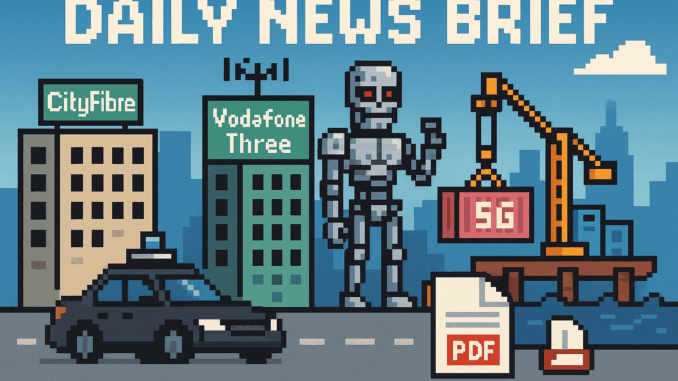
CityFibre’s Grand Fibre Leap for UK Business
Source: ComputerWeekly.com
CityFibre has cranked up its enterprise-grade Ethernet services to a sprawling 260,000 UK business premises via partner networks, a remarkable threefold expansion since last year. This fibre frenzy primarily aims at small and medium enterprises (SMEs) demanding high-speed connectivity for cloud migration and hybrid work setups. While this move snugly fits with Ofcom’s vision of full fibre by 2030, there’s some polite grumbling about the pace in more rural backwaters. Remember those dial-up days when downloading a humble 3MB file meant brewing a cuppa? Today, SMEs can bask in the glory of 1Gbps speeds — fast enough to whisk the entire DOOM II shareware across the ether in a blink of a pixel.
Vodafone Three’s Wireless Wonders: A Future-Proof Fibre Strategy?
Source: UK Tech News
Vodafone Three is having a chinwag with alt-network providers to bolt fixed wireless access (FWA) onto its fibre game plan. This hybrid strategy is set to plug those pesky service gaps in oft-forgotten regions while keeping infrastructure costs in check. With 2027 marking the analogue switchoff, and regulators nudging to boost rural broadband, the pressure’s on. The idea of merging wireless and fibre conjures up images of splicing coaxial cables for a cheeky Red Dwarf marathon from a neighbour’s VHS collection.
Uber’s Autonomous Adventure: Data Dilemmas and Trust in Tech
Source: Mirror
Uber’s robotic rides are hitting the streets of Birmingham, ushering in a wave of scepticism. A whopping 67% of folks are twitchy about data privacy, given these taxis are kitted out with lidar and biometric gizmos. The big question: who keeps the data, and for how long? Transport for London’s insistence on human oversight harks back to the ‘90s CCTV debates, with echoes of Terminator 2’s Skynet paranoia now applied to these sensor-packed autos. Who watches the machines, indeed?
SXSW London’s AI Agitation: A New Melody of Contention
Source: MSN
At this year’s SXSW London, sparks flew over AI-created tunes and deepfake defences. In a forward leap for artists’ rights, the UK Intellectual Property Office is clamping down on training datasets, mandating explicit consent from artists — a move that’s likely to ripple through the EU’s imminent AI Act adjustments. It’s a modern echo of the 1985 “Home Taping Is Killing Music” outcry, translating copyright concerns into the digitised, AI-tinged landscape of today.
Deutsche Telekom’s 5G Gambit: Pioneering Port Automation
Source: BTW Media
In Hamburg Port, Deutsche Telekom and Unikie are piloting cutting-edge vehicle logistics technology harnessing the power of 5G and edge computing. This nifty system automates cargo movement with a stellar 98% accuracy, notably slashing diesel usage by 40%. While currently an all-German affair, there’s a keen eye on potential UK uptake, especially in the post-Brexit logistics shuffle. It’s a bit like watching the tech fantasies of Neuromancer shape-shift into the reality of container choreography.
This Day in Tech History: PDFs, The Quiet Revolution of 1993
On this day in 1993, Adobe Acrobat and Reader quietly launched on Macintosh, bestowing us with the trusty PDF. Before this game-changer, sharing documents between Macs, PCs, and clunky office mainframes often ended in font kerfuffles and layout nightmares. Acrobat and Reader delivered on the promise of fidelity and portability, shifting how we trusted and traded our documents. Fast forward over three decades, PDFs remain a staple across boardrooms and classrooms, well beyond the humble beginnings that shook publishing back in the day.

Leave a Reply